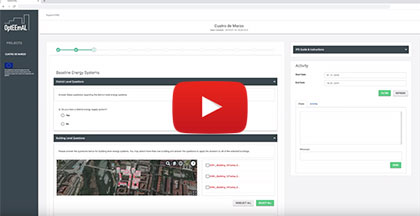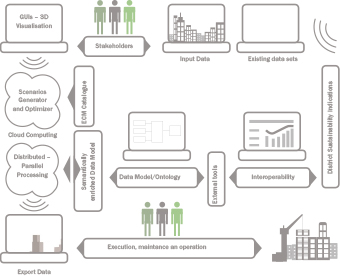Platform

The project aims to provide stakeholders with a web-based Platform for District Energy-Efficient Retrofitting Design, which will support integrated design methodologies for the systemic delivery of optimised designs, based on an Integrated Project Delivery (IPD) approach for building and district retrofitting projects and can help reduce uncertainties and the time during this process, resulting in significantly improved solutions when compared to business as usual practices. The platform will make use of input data from the district (geometrical, materials, renewable energy resources, existing energy systems, social aspects, economic data, barriers, specific targets, etc.) that will be processed in a four-step platform (diagnosis and formulation of scenarios; evaluation and optimisation; best scenario selection and data exportation) conducting an interactive design process with the stakeholders and obtaining, at the end of the process, an optimal retrofitting design according to the stakeholders’ priorities.
The key features of this platform are:
- The involvement of all stakeholders during the process will be ensured by establishing the proper interfaces that will guarantee that the results represent the interests of all involved players (architects, engineers, building managers, local administrators, citizens and policy makers), through defining the prioritisation criteria and checking and validating the generated scenarios.
- Existing tools will be integrated in the OptEEmAL web-based platform to ensure their interoperability in order to provide high quality validated solutions for building and district retrofitting projects, taking into account the subsequent operation and maintenance phases, and the interactions of the design process with the district in terms of key indicators (namely District Performance Indicators) that capture aspects related to energy, comfort, economy, social wellbeing, environment, and urban morphology through a common and standard data model.
- A systemic strategy to develop retrofitting design projects will be delivered, based on the retrofitting objectives, allowing the key stakeholders to select the best scenario according to their prioritisations, through an optimisation process for the evaluation of different retrofitting alternatives.





